*/
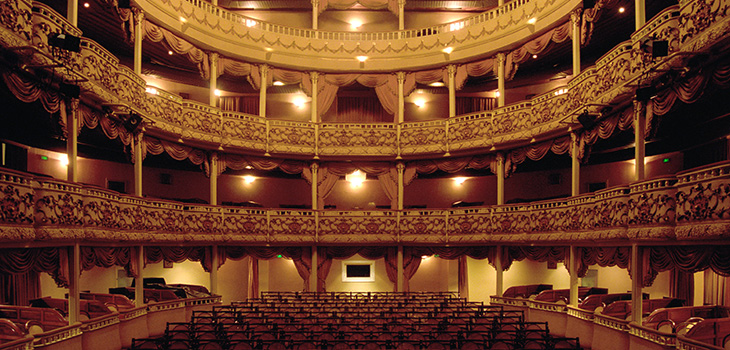

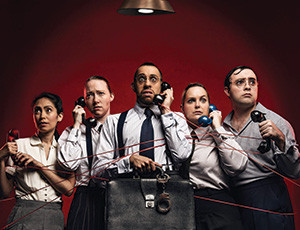
You don’t win the Olivier and WhatsOnStage Awards for Best New Musical of 2024, or receive more five star reviews than any show in recent history, without being something special.
Operation Mincemeat is a sensational musical that brings to life one of the most audacious and bizarre deception operations of World War II. The story is based on the real-life British intelligence operation of that name, which aimed to fool the Nazis into believing the Allies were planning to invade Sardinia rather than Sicily. The plan involved planting fake documents on the corpse of a homeless man, Glyndwr Michael, and setting the corpse adrift to be discovered by German forces.
It combines historical narrative and irreverent comedy, while satirising the British class system and wartime bureaucracy. The show (original cast pictured above) celebrates the ingenuity and absurdity of the original mission while acknowledging the real human stories behind the historical events.
The five-member cast delivers an exceptional performance, with each actor taking on multiple roles. Christian Andrews, as Hester Leggatt (and others) is the stand-out star, playing an aged spinster in a senior administrative role in MI5. Much of the joy of this show stems from the gender reversal of the lead characters, which adds to the comedy as Andrews makes you cry during his rendition of the stunningly sad track ‘Dear Bill’, describing the death of Hester’s boyfriend in World War I. Emily Barber (of Bridgerton fame) plays the lead, charismatic spy Ewan Montague. She struts her way around the stage, playing the odiously arrogant yet weirdly charming Eton to Oxbridge to MI5 character.
The choreography by Jenny Arnold is dynamic and complements the comedic elements of the show. A memorable scene involves a meticulously choreographed routine with hats, phones, and a briefcase, reminiscent of classic comedy sketches from the 50s.
The musical score, composed by Felix Hagan, spans various genres from vaudevillian tunes to modern pop and spoken rap reminiscent of Hamilton. I’ve listened to the soundtrack somewhere between a million and a zillion times. Notable songs include ‘Das Übermensch’, a satirical pop number performed by a group of Nazis, and ‘Glitzy Finale’, which will have you crying with laughter.
The show has an unusual pricing structure. Every seat in the house, whether centre stalls or in the gods, is the same price. But the price differs according to the day of the week, starting from £39 on a Monday night to £89 per seat on Fridays and Saturdays. The Monday night seats go within minutes of each announced extension, but there tends to be good availability as the week goes on. There is a weekly lottery for cheap tickets at www.operationmincemeat.com, but the show has generated such a cult following you’re unlikely to get tickets by this route.
Now, a word to the wise. The Fortune Theatre is not my favourite venue. Be wary of any seats in the stalls with a seat number lower than 5. The peculiar layout of the theatre mean these seats extend far to the left of the stage and you will have a poor view. The stage is high and if you are in the front three rows of the stalls, you’ll be looking at the actors’ feet unless you want a crick in your neck. And I’ve heard, anecdotally, that the seats in the balcony have very restricted leg room. So basically you want a seat in rows C-H of the stalls, with a seat number of 6 or higher.
Subject to getting a good seat, this is a truly standout production. I cannot recommend it highly enough.

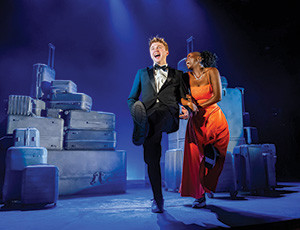
Apart from the irritating use of unnecessary brackets in its title, Two Strangers (Carry a Cake Across New York) is a delightful new musical rom-com, with humour, romance, and a dash of holiday spirit to create a fabulous theatrical experience.
The story revolves around Dougal, an optimistic and somewhat naive Brit who flies to New York for his father’s second wedding – a father he’s never met. Upon arrival, he is greeted by Robin, the bride’s sister, a jaded New Yorker who is less than thrilled about her new assignment. Over the course of a whirlwind 36-hour adventure, the two navigate the city, confront their personal insecurities, and slowly develop an unexpected bond.
The script is an homage to classic rom-com tropes, filled with sharp dialogue and endearing character moments. It avoids cliché by injecting fresh, modern elements, such as a hilarious song about the perils of Tinder dating and astute observations about the reality of life in New York for minimum-wage workers.
Sam Tutty and Dujonna Gift are the (only) two actors in the show. Tutty’s performance is a masterclass in comic timing and emotional depth. His portrayal of Dougal, with his boundless enthusiasm and endearing awkwardness, is reminiscent of a young Hugh Grant. Tutty balances her character’s naivety with moments of poignant vulnerability, making Robin a thoroughly lovable protagonist. She is the perfect foil to Dougal’s exuberance. Her portrayal captures the essence of a world-weary New Yorker. Her powerful vocals and emotional range brings depth to a character who, on the surface, appears tough and unapproachable. The chemistry between Tutty and Gift is electric, and their interactions are the heart of the show.
The musical score is a delightful blend of genres, from Sinatra-era swing to contemporary ballads. Standout numbers include ‘American Express’, a whimsical ode to New York’s allure, and ‘On The App’, a comedic take on modern dating. The music is consistently engaging, with clever lyrics that advance the plot and deepen character development.
Soutra Gilmour’s dynamic set design features a series of flight cases that transform into various New York locales, such as a Chinatown restaurant and the Plaza Hotel. The set’s flexibility allows for seamless transitions between scenes, maintaining the story’s momentum. The lighting design enhances the mood of each scene, from the romantic glow of an ice-skating rink to the harsh fluorescent lights of a New York subway.
Two Strangers (Carry a Cake Across New York) is a refreshing addition to the West End. It’s a feel-good musical that resonates with audiences through its humour, heart, and outstanding performances.

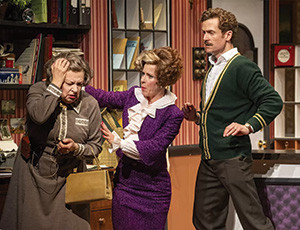
The greatest British sitcom is now a brand-new stage play. John Cleese has blended the scripts of three beloved episodes and brought them to life on stage. The storylines include the arrival of hotel inspectors, Basil’s mishandling of three German guests, and comedic misadventures with the hard-of-hearing Mrs Richards. Basil even does the walk and the moustache thing. It’s like watching the television series all over again.
The plot spans two days at the chaotic Torquay hotel, staying true to the original episodes and retaining the sharp wit and timing that made the sitcom a classic.
Adam Jackson-Smith leads the cast as Basil Fawlty, delivering a performance that captures the essence of John Cleese’s original portrayal. His physical comedy, from manic panic to sardonic sneers, is spot-on. Anna-Jane Casey’s Sybil Fawlty likewise captures the character’s haughty demeanor and iconic laugh with uncanny accuracy. Victoria Fox as Polly and Hemi Yeroham as Manuel also shine, with Fox providing a steady, sarcastic foil to the chaos, and Yeroham injecting a youthful, endearing energy into the role of the beleaguered waiter.
Caroline Jay Ranger’s direction keeps the energy high and the pacing brisk, mirroring the frantic rhythm of the TV episodes. The set design recreates the look of the original Fawlty Towers, down to the smallest detail, with familiar costumes adding authenticity. Ranger has successfully translated the slapstick and farcical elements of the original series into a theatrical format, ensuring that the humour lands effectively in a live setting.
The play’s success lies in its ability to evoke fond memories while still delivering fresh laughs. The laughter and applause during the performance demonstrate that the material remains as brilliantly funny as ever, decades after its initial broadcast. At least to a certain demographic. I am in my mid 50s, and may have been the youngest person in the audience. It’s brilliantly nostalgic for fans, but probably less appealing to younger people who don’t know the original TV show.

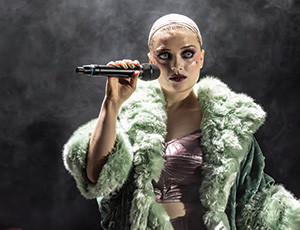
This Playhouse Theatre production of Cabaret is a triumph of theatrical storytelling.
From the moment you enter the theatre, you’re transported to the seedy underbelly of 1929 Berlin. The entire theatre has been reconfigured into an in-the-round space, with the circular stage surrounded by cabaret tables and theatre seats. It gives you an intimate atmosphere, allowing you to feel like a voyeur in the real Kit Kat Club.
The pre-show experience is spectacular. You enter through the stage door and descend into a basement adorned with 1920s details; shot glasses of schnapps are thrust into your hand as you descend into the depths of the theatre. Three bars, bathed respectively in red light, green light and one stunningly opulent with gold decor, set the tone for the evening. Live music and sexually liberal performers roam around and mix with the audience, creating an immersive prologue before you even step foot into the auditorium (the producers say the show is not suitable for children under 13, by the way. I agree).
Cabaret is based on Christopher Isherwood’s semi-autobiographical novel Goodbye to Berlin. It tells the story of American writer Clifford Bradshaw’s experiences in Berlin during the twilight of the Weimar Republic. As he becomes entangled with English cabaret performer Sally Bowles, we see the decadence of the era juxtaposed against the rising tide of Nazism. A poignant subplot involves the doomed romance between German boarding house owner Fräulein Schneider and Jewish fruit vendor Herr Schultz. Their story serves as a heartbreaking reminder of the human cost of political upheaval. Overseeing the proceedings is the enigmatic Emcee, whose performances at the Kit Kat Club serve as a metaphor for the ominous political developments unfolding in Germany.
The show is known for the rotating actors playing the lead roles (Sally Bowles and Emcee), each of whom perform for four months as a couple before being replaced with new star casting. The current leads are probably the least famous I have seen (previous incumbents include Eddie Redmayne and Cara Delavinge, who was sitting in the audience when I saw it this time round). Rhea Norwood (Heartstopper) plays Sally. Her training as an actor, rather than in musical theatre, is obvious, offering a nuanced interpretation that balances vulnerability with a world-weary cynicism. Her renditions of iconic numbers like ‘Maybe This Time’ and the titular ‘Cabaret’ are powerful and heartbreaking, capturing the essence of a woman desperate to escape reality.
Layton Williams (best known as Jamie New from Everybody’s Talking About Jamie) takes on the challenging role of Emcee. His portrayal is freakish and fantastic, with a playful and unsettling energy. His facial expressions and vocal tics add complexity to the role, making the Emcee’s transformation from mischievous host to sinister harbinger chilling.
Fenton Gray and Sally Ann Triplett bring warmth and tenderness to the roles of Fräulein Schneider and Herr Schultz. Their two main musical numbers, ‘Pineapple’ and ‘Marriage’, will bring a tear to your eye. The doomed love story is really very, very sad, even when you know what is coming.
Rebecca Frecknall’s direction takes the familiar story and infuses it with new energy and relevance. The decision to stage the show in the round creates a sense of claustrophobia and complicity, forcing the audience to confront the horrors unfolding before them. The dance numbers are sultry, provocative, and meticulously executed, enhancing the narrative while showcasing the talents of the ensemble. The choreography in ‘Mein Herr’ and ‘Money’ blends sensuality with a raw, almost confrontational energy that keeps you on the edge of your seat. Set and costume design is equally impressive. The Kit Kat Club is brought to life with a grungy, immersive aesthetic that captures the decadence and decay of 1930s Berlin. Scutt’s costumes are a visual feast, from Sally’s glittering gowns to the Emcee’s ever-changing, flamboyant attire
At its core, Cabaret is a cautionary tale about the dangers of political apathy and the seductive power of escapism. Frecknall’s production doesn’t shy away from these themes, drawing parallels between the rise of fascism in 1930s Germany and contemporary political movements. The show’s exploration of sexuality, identity, and persecution is a must-see, a dazzling yet sobering reflection of a world teetering on the brink.



You don’t win the Olivier and WhatsOnStage Awards for Best New Musical of 2024, or receive more five star reviews than any show in recent history, without being something special.
Operation Mincemeat is a sensational musical that brings to life one of the most audacious and bizarre deception operations of World War II. The story is based on the real-life British intelligence operation of that name, which aimed to fool the Nazis into believing the Allies were planning to invade Sardinia rather than Sicily. The plan involved planting fake documents on the corpse of a homeless man, Glyndwr Michael, and setting the corpse adrift to be discovered by German forces.
It combines historical narrative and irreverent comedy, while satirising the British class system and wartime bureaucracy. The show (original cast pictured above) celebrates the ingenuity and absurdity of the original mission while acknowledging the real human stories behind the historical events.
The five-member cast delivers an exceptional performance, with each actor taking on multiple roles. Christian Andrews, as Hester Leggatt (and others) is the stand-out star, playing an aged spinster in a senior administrative role in MI5. Much of the joy of this show stems from the gender reversal of the lead characters, which adds to the comedy as Andrews makes you cry during his rendition of the stunningly sad track ‘Dear Bill’, describing the death of Hester’s boyfriend in World War I. Emily Barber (of Bridgerton fame) plays the lead, charismatic spy Ewan Montague. She struts her way around the stage, playing the odiously arrogant yet weirdly charming Eton to Oxbridge to MI5 character.
The choreography by Jenny Arnold is dynamic and complements the comedic elements of the show. A memorable scene involves a meticulously choreographed routine with hats, phones, and a briefcase, reminiscent of classic comedy sketches from the 50s.
The musical score, composed by Felix Hagan, spans various genres from vaudevillian tunes to modern pop and spoken rap reminiscent of Hamilton. I’ve listened to the soundtrack somewhere between a million and a zillion times. Notable songs include ‘Das Übermensch’, a satirical pop number performed by a group of Nazis, and ‘Glitzy Finale’, which will have you crying with laughter.
The show has an unusual pricing structure. Every seat in the house, whether centre stalls or in the gods, is the same price. But the price differs according to the day of the week, starting from £39 on a Monday night to £89 per seat on Fridays and Saturdays. The Monday night seats go within minutes of each announced extension, but there tends to be good availability as the week goes on. There is a weekly lottery for cheap tickets at www.operationmincemeat.com, but the show has generated such a cult following you’re unlikely to get tickets by this route.
Now, a word to the wise. The Fortune Theatre is not my favourite venue. Be wary of any seats in the stalls with a seat number lower than 5. The peculiar layout of the theatre mean these seats extend far to the left of the stage and you will have a poor view. The stage is high and if you are in the front three rows of the stalls, you’ll be looking at the actors’ feet unless you want a crick in your neck. And I’ve heard, anecdotally, that the seats in the balcony have very restricted leg room. So basically you want a seat in rows C-H of the stalls, with a seat number of 6 or higher.
Subject to getting a good seat, this is a truly standout production. I cannot recommend it highly enough.


Apart from the irritating use of unnecessary brackets in its title, Two Strangers (Carry a Cake Across New York) is a delightful new musical rom-com, with humour, romance, and a dash of holiday spirit to create a fabulous theatrical experience.
The story revolves around Dougal, an optimistic and somewhat naive Brit who flies to New York for his father’s second wedding – a father he’s never met. Upon arrival, he is greeted by Robin, the bride’s sister, a jaded New Yorker who is less than thrilled about her new assignment. Over the course of a whirlwind 36-hour adventure, the two navigate the city, confront their personal insecurities, and slowly develop an unexpected bond.
The script is an homage to classic rom-com tropes, filled with sharp dialogue and endearing character moments. It avoids cliché by injecting fresh, modern elements, such as a hilarious song about the perils of Tinder dating and astute observations about the reality of life in New York for minimum-wage workers.
Sam Tutty and Dujonna Gift are the (only) two actors in the show. Tutty’s performance is a masterclass in comic timing and emotional depth. His portrayal of Dougal, with his boundless enthusiasm and endearing awkwardness, is reminiscent of a young Hugh Grant. Tutty balances her character’s naivety with moments of poignant vulnerability, making Robin a thoroughly lovable protagonist. She is the perfect foil to Dougal’s exuberance. Her portrayal captures the essence of a world-weary New Yorker. Her powerful vocals and emotional range brings depth to a character who, on the surface, appears tough and unapproachable. The chemistry between Tutty and Gift is electric, and their interactions are the heart of the show.
The musical score is a delightful blend of genres, from Sinatra-era swing to contemporary ballads. Standout numbers include ‘American Express’, a whimsical ode to New York’s allure, and ‘On The App’, a comedic take on modern dating. The music is consistently engaging, with clever lyrics that advance the plot and deepen character development.
Soutra Gilmour’s dynamic set design features a series of flight cases that transform into various New York locales, such as a Chinatown restaurant and the Plaza Hotel. The set’s flexibility allows for seamless transitions between scenes, maintaining the story’s momentum. The lighting design enhances the mood of each scene, from the romantic glow of an ice-skating rink to the harsh fluorescent lights of a New York subway.
Two Strangers (Carry a Cake Across New York) is a refreshing addition to the West End. It’s a feel-good musical that resonates with audiences through its humour, heart, and outstanding performances.


The greatest British sitcom is now a brand-new stage play. John Cleese has blended the scripts of three beloved episodes and brought them to life on stage. The storylines include the arrival of hotel inspectors, Basil’s mishandling of three German guests, and comedic misadventures with the hard-of-hearing Mrs Richards. Basil even does the walk and the moustache thing. It’s like watching the television series all over again.
The plot spans two days at the chaotic Torquay hotel, staying true to the original episodes and retaining the sharp wit and timing that made the sitcom a classic.
Adam Jackson-Smith leads the cast as Basil Fawlty, delivering a performance that captures the essence of John Cleese’s original portrayal. His physical comedy, from manic panic to sardonic sneers, is spot-on. Anna-Jane Casey’s Sybil Fawlty likewise captures the character’s haughty demeanor and iconic laugh with uncanny accuracy. Victoria Fox as Polly and Hemi Yeroham as Manuel also shine, with Fox providing a steady, sarcastic foil to the chaos, and Yeroham injecting a youthful, endearing energy into the role of the beleaguered waiter.
Caroline Jay Ranger’s direction keeps the energy high and the pacing brisk, mirroring the frantic rhythm of the TV episodes. The set design recreates the look of the original Fawlty Towers, down to the smallest detail, with familiar costumes adding authenticity. Ranger has successfully translated the slapstick and farcical elements of the original series into a theatrical format, ensuring that the humour lands effectively in a live setting.
The play’s success lies in its ability to evoke fond memories while still delivering fresh laughs. The laughter and applause during the performance demonstrate that the material remains as brilliantly funny as ever, decades after its initial broadcast. At least to a certain demographic. I am in my mid 50s, and may have been the youngest person in the audience. It’s brilliantly nostalgic for fans, but probably less appealing to younger people who don’t know the original TV show.


This Playhouse Theatre production of Cabaret is a triumph of theatrical storytelling.
From the moment you enter the theatre, you’re transported to the seedy underbelly of 1929 Berlin. The entire theatre has been reconfigured into an in-the-round space, with the circular stage surrounded by cabaret tables and theatre seats. It gives you an intimate atmosphere, allowing you to feel like a voyeur in the real Kit Kat Club.
The pre-show experience is spectacular. You enter through the stage door and descend into a basement adorned with 1920s details; shot glasses of schnapps are thrust into your hand as you descend into the depths of the theatre. Three bars, bathed respectively in red light, green light and one stunningly opulent with gold decor, set the tone for the evening. Live music and sexually liberal performers roam around and mix with the audience, creating an immersive prologue before you even step foot into the auditorium (the producers say the show is not suitable for children under 13, by the way. I agree).
Cabaret is based on Christopher Isherwood’s semi-autobiographical novel Goodbye to Berlin. It tells the story of American writer Clifford Bradshaw’s experiences in Berlin during the twilight of the Weimar Republic. As he becomes entangled with English cabaret performer Sally Bowles, we see the decadence of the era juxtaposed against the rising tide of Nazism. A poignant subplot involves the doomed romance between German boarding house owner Fräulein Schneider and Jewish fruit vendor Herr Schultz. Their story serves as a heartbreaking reminder of the human cost of political upheaval. Overseeing the proceedings is the enigmatic Emcee, whose performances at the Kit Kat Club serve as a metaphor for the ominous political developments unfolding in Germany.
The show is known for the rotating actors playing the lead roles (Sally Bowles and Emcee), each of whom perform for four months as a couple before being replaced with new star casting. The current leads are probably the least famous I have seen (previous incumbents include Eddie Redmayne and Cara Delavinge, who was sitting in the audience when I saw it this time round). Rhea Norwood (Heartstopper) plays Sally. Her training as an actor, rather than in musical theatre, is obvious, offering a nuanced interpretation that balances vulnerability with a world-weary cynicism. Her renditions of iconic numbers like ‘Maybe This Time’ and the titular ‘Cabaret’ are powerful and heartbreaking, capturing the essence of a woman desperate to escape reality.
Layton Williams (best known as Jamie New from Everybody’s Talking About Jamie) takes on the challenging role of Emcee. His portrayal is freakish and fantastic, with a playful and unsettling energy. His facial expressions and vocal tics add complexity to the role, making the Emcee’s transformation from mischievous host to sinister harbinger chilling.
Fenton Gray and Sally Ann Triplett bring warmth and tenderness to the roles of Fräulein Schneider and Herr Schultz. Their two main musical numbers, ‘Pineapple’ and ‘Marriage’, will bring a tear to your eye. The doomed love story is really very, very sad, even when you know what is coming.
Rebecca Frecknall’s direction takes the familiar story and infuses it with new energy and relevance. The decision to stage the show in the round creates a sense of claustrophobia and complicity, forcing the audience to confront the horrors unfolding before them. The dance numbers are sultry, provocative, and meticulously executed, enhancing the narrative while showcasing the talents of the ensemble. The choreography in ‘Mein Herr’ and ‘Money’ blends sensuality with a raw, almost confrontational energy that keeps you on the edge of your seat. Set and costume design is equally impressive. The Kit Kat Club is brought to life with a grungy, immersive aesthetic that captures the decadence and decay of 1930s Berlin. Scutt’s costumes are a visual feast, from Sally’s glittering gowns to the Emcee’s ever-changing, flamboyant attire
At its core, Cabaret is a cautionary tale about the dangers of political apathy and the seductive power of escapism. Frecknall’s production doesn’t shy away from these themes, drawing parallels between the rise of fascism in 1930s Germany and contemporary political movements. The show’s exploration of sexuality, identity, and persecution is a must-see, a dazzling yet sobering reflection of a world teetering on the brink.


The Bar Council is ready to support a turn to the efficiencies that will make a difference
By Louise Crush of Westgate Wealth Management
Marie Law, Director of Toxicology at AlphaBiolabs, examines the latest ONS data on drug misuse and its implications for toxicology testing in family law cases
An interview with Rob Wagg, CEO of New Park Court Chambers
What meaningful steps can you take in 2026 to advance your legal career? asks Thomas Cowan of St Pauls Chambers
Marie Law, Director of Toxicology at AlphaBiolabs, explains why drugs may appear in test results, despite the donor denying use of them
Ever wondered what a pupillage is like at the CPS? This Q and A provides an insight into the training, experience and next steps
The appointments of 96 new King’s Counsel (also known as silk) are announced today
Ready for the new way to do tax returns? David Southern KC continues his series explaining the impact on barristers. In part 2, a worked example shows the specific practicalities of adapting to the new system
Resolution of the criminal justice crisis does not lie in reheating old ideas that have been roundly rejected before, say Ed Vickers KC, Faras Baloch and Katie Bacon
With pupillage application season under way, Laura Wright reflects on her route to ‘tech barrister’ and offers advice for those aiming at a career at the Bar